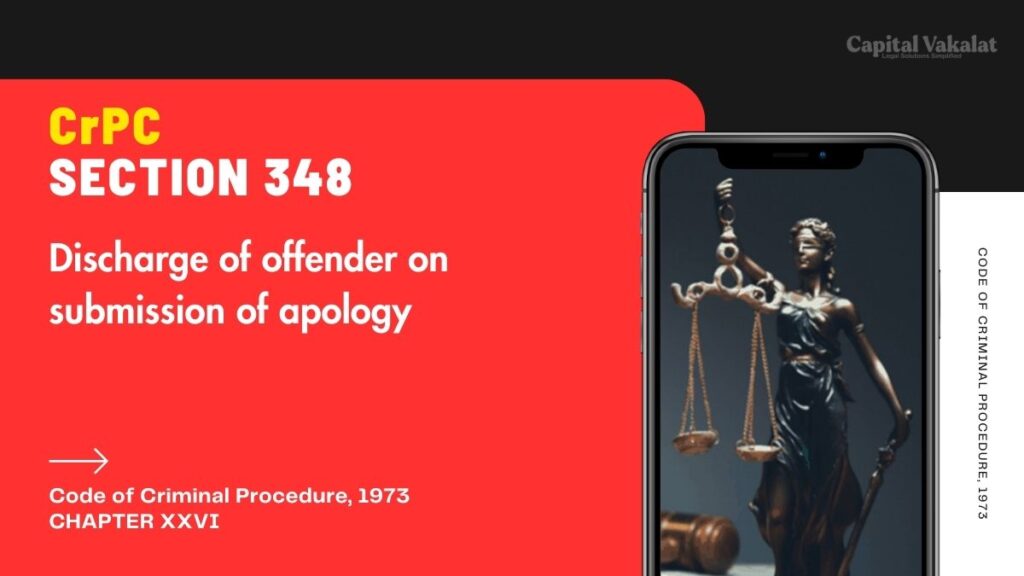The Indian judicial system, governed by the Criminal Procedure Code (CrPC), is designed to ensure justice and uphold the rule of law. Among its many provisions, section 348 CrPC stands out due to its unique approach to resolving criminal cases. This section allows for the discharge of an offender upon the submission of an apology, highlighting the significance of remorse and reconciliation in the legal process.

This article delves into the intricacies of section 348 CrPC, examining its historical context, legal framework, implications, and broader societal impact.
Understanding Section 348 CrPC
The Criminal Procedure Code (CrPC) of India, enacted in 1973, lays down the procedural aspects of criminal law. Section 348 specifically addresses scenarios where an offender can be discharged upon tendering an apology. This provision is rooted in the belief that an acknowledgment of wrongdoing and a genuine apology can serve as a powerful tool for justice and rehabilitation.
The Legal Framework
Section 348 CrPC plays a pivotal role in the Indian judiciary by offering a mechanism for the amicable resolution of certain criminal cases. It provides an opportunity for offenders to express remorse and for victims to receive closure through an official apology. This framework is designed to reduce the burden on courts while fostering a culture of accountability and restitution.
Apology Submission Process
The process of apology submission under section 348 CrPC involves several key steps. Firstly, the offender must formally admit their guilt and express sincere remorse for their actions. This apology is then submitted to the court, which evaluates its genuineness and the context of the offense. If the court is satisfied with the apology, it may discharge the offender from further legal proceedings.
Criteria for Discharge under Section 348
The discharge of an offender under section 348 CrPC is contingent upon meeting specific legal requirements. The apology must be voluntary, unequivocal, and demonstrate a clear understanding of the wrongdoing. Additionally, the court considers the nature and severity of the offense, the offender’s prior criminal record, and the impact on the victim before making a discharge decision.
Implications of Discharge
The implications of discharging an offender on the submission of an apology are multifaceted. For the offender, it provides an opportunity to avoid a criminal record and rehabilitate their reputation. For the victim, it can offer a sense of justice and closure, knowing that the offender has acknowledged their wrongdoing and expressed remorse.
Case Studies
Several notable case studies illustrate the application of section 348 CrPC. One such example involves a minor theft case where the offender, a first-time offender, submitted a heartfelt apology to the victim. The court, recognizing the sincerity of the apology and the minor nature of the offense, discharged the offender, emphasizing the importance of rehabilitation over punishment.
Challenges and Criticisms
Despite its positive aspects, section 348 CrPC has faced criticisms and challenges. Legal experts argue that the provision may be misused by offenders to escape punishment, particularly in cases involving serious crimes. Ethical concerns also arise regarding the pressure on victims to accept apologies, potentially undermining their sense of justice.
Comparative Analysis
A comparative analysis of similar provisions in other jurisdictions reveals varied approaches to the concept of discharge on apology. For instance, some countries incorporate restorative justice practices that emphasize reconciliation and community involvement in the justice process. These comparative insights can inform potential reforms to section 348 CrPC, ensuring it aligns with global best practices.
Role of Judiciary in Discharge Decisions
The judiciary plays a crucial role in evaluating apologies and determining the appropriateness of discharge under section 348 CrPC. Judges exercise significant discretion, balancing the interests of justice, victim rights, and offender rehabilitation. This judicial discretion is vital in ensuring that the provision is applied judiciously and fairly.
Public Perception
Public perception of section 348 CrPC is mixed, with some viewing it as a compassionate and progressive approach to justice, while others express concerns about its potential for abuse. Understanding and addressing these perceptions is essential for maintaining public trust in the judicial system and the efficacy of this provision.
Expert Opinions
Legal scholars and experts offer diverse opinions on section 348 CrPC. Some advocate for its broader application as a means to promote restorative justice, while others call for stricter guidelines to prevent misuse. These expert insights contribute to the ongoing debate and inform potential reforms.
Reforms and Recommendations
To address the challenges and criticisms associated with section 348 CrPC, several reforms and recommendations have been proposed. These include clearer guidelines for evaluating apologies, enhanced support for victims, and stricter criteria for offenses eligible for discharge. Implementing these reforms can strengthen the provision and ensure its effective and fair application.
Conclusion
Section 348 CrPC represents a unique and significant aspect of the Indian judicial system, emphasizing the power of apology and remorse in achieving justice. While it offers numerous benefits, including offender rehabilitation and victim closure, it also poses challenges that must be carefully managed. Through thoughtful reforms and ongoing evaluation, section 348 CrPC can continue to serve as a valuable tool for promoting justice and reconciliation.